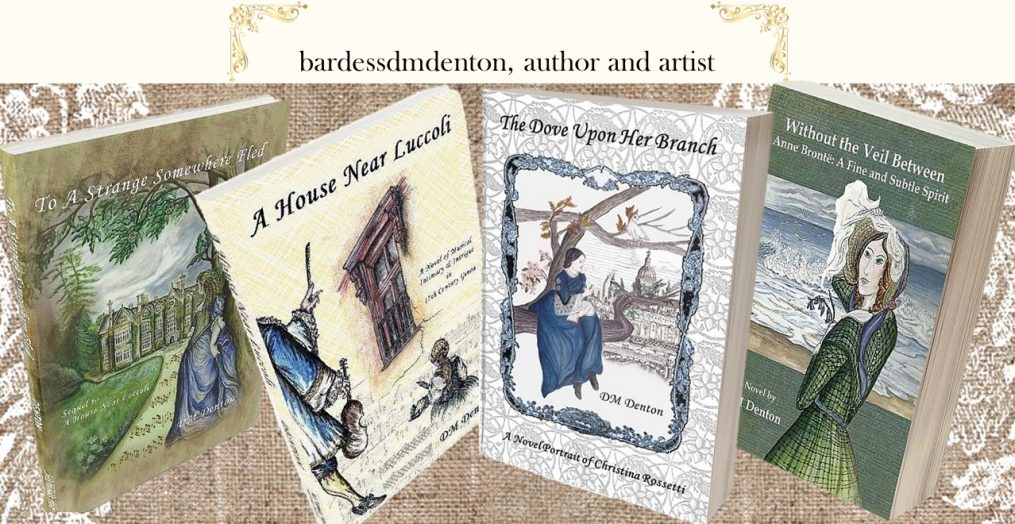To regret the exchange of earthly pleasures for the joys of Heaven, is as if the groveling caterpillar should lament that it must one day quit the nibbled leaf to soar aloft and flutter through the air, roving at will from flower to flower, sipping sweet honey from their cups, or basking in their sunny petals. If these little creatures knew how great a change awaited them, no doubt they would regret it; but would not all such sorrow be misplaced?
~ Anne Brontë, The Tenant of Wildfell Hall
Today is the 169th anniversary of the death of Anne Brontë (born: Jan 17, 1820, Thornton, West Yorkshire, England; died: May 28, 1849, Scarborough, North Yorkshire, England).

Recently I was told (by a non-writer on discovering I was a published author and of what genre) that historical and biographical novels were the easiest to write, because the characters and stories didn’t have to be invented: the names, places, events, and endings ready-made, just a little research and a few decisions on where to begin and what to include and exclude all that was needed to fill the pages.
What he didn’t take into account was the responsibility and long-term involvement there is in resurrecting real people—well, there should be if you’re really doing it from a place of love for and/or commitment to your subject. He also didn’t understand how intense and even complicated it can get weaving what is certainly and uncertainly known, various viewpoints, differing opinions and accounts into a vibrant, engaging narrative that credibly recreates the historical person, their time and environment. Even in fiction, accuracy is always an essential ingredient—of course, indebted to the work and writing of wonderful researchers and biographers—complicated by a storyteller’s compulsion to go behind, beneath, and in-between the facts, to interpret, dramatize, physcologize, sensitize, and, of course, imagine just as writers in other genres do.
In my experience, first in my novel A House Near Luccoli, and again in Without the Veil Between, Anne Brontë: A Fine and Subtle Spirit, the responsibility is never heavier than when one writes about a historical figure whose death, usually because it was sudden or untimely, has become the most renowned part of his/her story.
In Without the Veil Between, I didn’t want to write a novel moving head on towards the tragedy of Anne passing too soon from this world, but one that wandered where she inwardly and outwardly did, along with who she affected and affected her, through what she loved and enjoyed, doubted and believed, meeting fulfillment and disappointment, and, of course, entertaining her romantic, conscientious, and spiritual muse.
I longed to view that bliss divine,
Which eye hath never seen;
Like Moses, I would see His face
Without the veil between.
~ from Anne Brontë’s poem, A Happy Day in February
I really wasn’t sure how I was going to deal with Anne’s death up until the last part of the novel, except I knew I didn’t want it to be cast in melodrama. I let it come to me as it did to Anne, not as a lament but with gratefulness for her fine and subtle, purposeful and poetic life without end.
My soul is awakened, my spirit is soaring and carried aloft on the wings of the breeze.
~ Anne Brontë, Agnes Grey

She still wanted to try recommended therapies and looked forward to revisiting Scarborough and her writing. By January’s close it seemed Anne’s own end, for whatever reason, even consumption’s trickery, had been deferred. She felt well enough to use ink and work on an unfinished poem as if it was the beginning of her life as she always meant to live it: more humble, more wise, more strengthened for strife, more apt to lean on God’s love than away from His will. Meant only for her eyes, she crafted and corrected the lines and verses that had come out of a dreadful darkness and bewildered mind. In a calmer body she found the brightness of faith and clarity of thought to add hope where there was none, abundance when all seemed lost, and, in winter’s brief respite, warmth in her heart for when the frost returned.
~ from Without the Veil Between

On the Death of Anne Brontë
THERE ‘s little joy in life for me,
And little terror in the grave ;
I ‘ve lived the parting hour to see
Of one I would have died to save.
Calmly to watch the failing breath,
Wishing each sigh might be the last ;
Longing to see the shade of death
O’er those belovèd features cast.
The cloud, the stillness that must part
The darling of my life from me ;
And then to thank God from my heart,
To thank Him well and fervently ;
Although I knew that we had lost
The hope and glory of our life ;
And now, benighted, tempest-tossed,
Must bear alone the weary strife.
~ Charlotte Brontë

“Please, take my hand,” Charlotte reached back to her sister, “or I’m afraid I’ll lose you like a feather in this wind.”
~ from Without the Veil Between
Farewell to thee! but not farewell
To all my fondest thoughts of thee:
Within my heart they still shall dwell;
And they shall cheer and comfort me.
~ Anne Brontë
Time is running out to enter to win a signed copy of Without the Veil Between and a print of one of the illustrations included in it. Please visit my previous post to find out how. You have nothing to lose, only to win!
![]() ©Artwork and writing, unless otherwise indicated, are the property of Diane M Denton. Please request permission to reproduce or post elsewhere with a link back to bardessdmdenton. Thank you.
©Artwork and writing, unless otherwise indicated, are the property of Diane M Denton. Please request permission to reproduce or post elsewhere with a link back to bardessdmdenton. Thank you.


